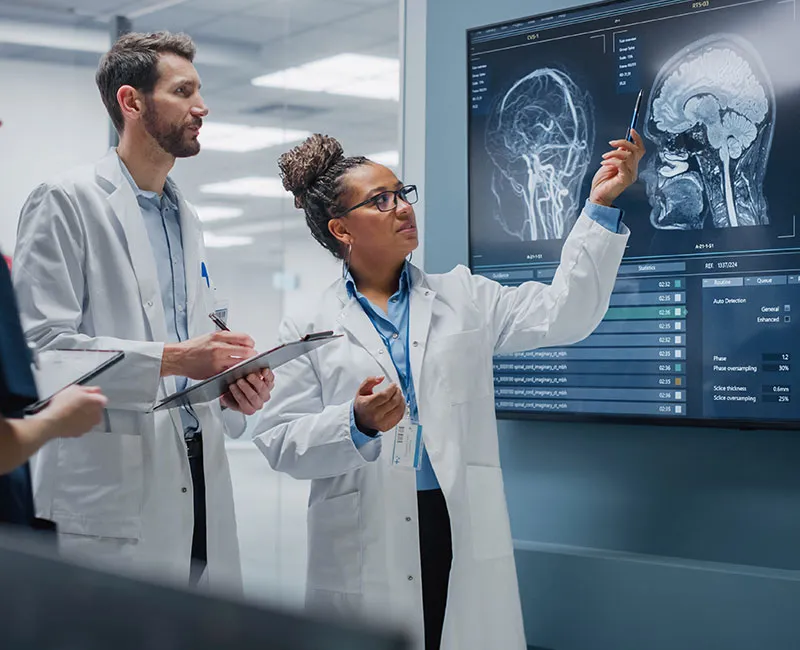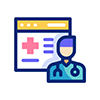


A stroke is a medical emergency that requires immediate attention. At Ashraya Hospital, we offer comprehensive stroke care, from acute management to rehabilitation. Our experienced doctors and specialists work together to provide personalised treatment plans to manage stroke and its complications. With state-of-the-art facilities in Wakad and Pimpri-Chinchwad, we are committed to delivering prompt, effective care to help our patients recover and regain their quality of life.
A stroke can have long-lasting effects on physical and cognitive abilities. Therefore, early diagnosis, fast treatment, and continuous rehabilitation are critical in improving outcomes and reducing the chances of long-term disability. Our expert team is dedicated to giving you the best possible care at every stage of your stroke recovery.
A stroke occurs when the blood flow to a part of the brain is interrupted, causing brain cells to die due to a lack of oxygen. There are two main types of strokes:
Early recognition and prompt treatment are essential to prevent brain damage and improve recovery outcomes.
Recognising the signs of a stroke early can significantly improve treatment outcomes. Common symptoms include:
If you or someone you are with experiences these symptoms, seek immediate medical help. Time is critical in treating strokes.
Here’s why Ashraya Hospital is the preferred choice for stroke treatment in Wakad and Pimpri-Chinchwad:

Our team of experienced neurologists, neurovascular surgeons, and rehabilitation specialists is dedicated to providing high-quality stroke care.

We provide round-the-clock emergency services to address strokes promptly and ensure timely treatment.

From initial assessment and emergency care to post-stroke rehabilitation, we offer complete care for stroke patients.

We use state-of-the-art imaging technologies like CT scans and MRIs to quickly diagnose and evaluate the severity of strokes.

We work with a multidisciplinary team of specialists to create a personalised treatment plan tailored to the patient’s needs.

We offer comprehensive stroke rehabilitation programs to help patients recover motor skills, speech, and cognitive functions.
At Ashraya Hospital, we follow a well-defined treatment protocol to ensure that patients receive the most effective stroke care. Our approach includes:



Stroke is a medical emergency, and every minute counts. If you or someone you know is experiencing any of the following signs, seek emergency medical attention immediately:
The faster you act, the better the chances of reducing brain damage and improving the outcome. Call emergency services or head straight to the nearest emergency room if stroke symptoms occur.
At Ashraya Hospital, we are committed to providing comprehensive stroke care to our patients in Wakad and Pimpri-Chinchwad. If you or a loved one is at risk for stroke or experiencing symptoms, don’t wait. Early detection and intervention can save lives.
Here are answers to some common questions about stroke treatment:
The first step in stroke treatment is to diagnose the type of stroke using imaging tests like CT scans or MRIs. Based on the diagnosis, treatment can include medications or surgery to restore blood flow or stop bleeding in the brain.
Recovery time varies depending on the severity of the stroke and the treatment received. Some patients may recover within months, while others may require long-term rehabilitation.
While not all strokes can be prevented, lifestyle changes such as maintaining a healthy diet, regular exercise, and controlling conditions like high blood pressure and diabetes can significantly reduce the risk.
Sudden weakness or numbness in the face, arms, or legs, especially on one side of the body, difficulty speaking, and severe headache are all common signs of a stroke.
Stroke rehabilitation is important for recovery. It helps regain lost motor functions, improve speech, and manage cognitive changes that result from a stroke. Rehabilitation can greatly improve the quality of life after a stroke.